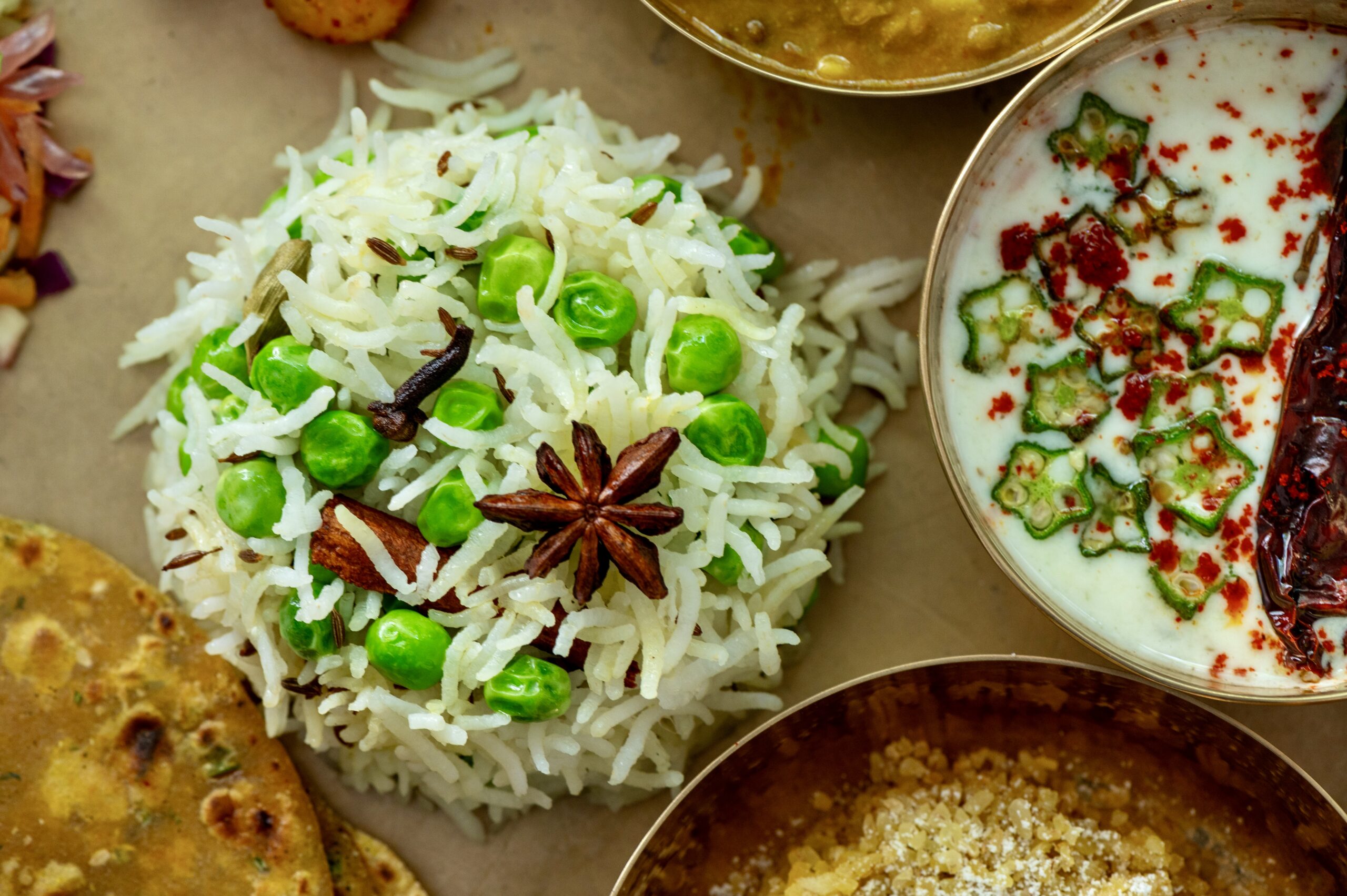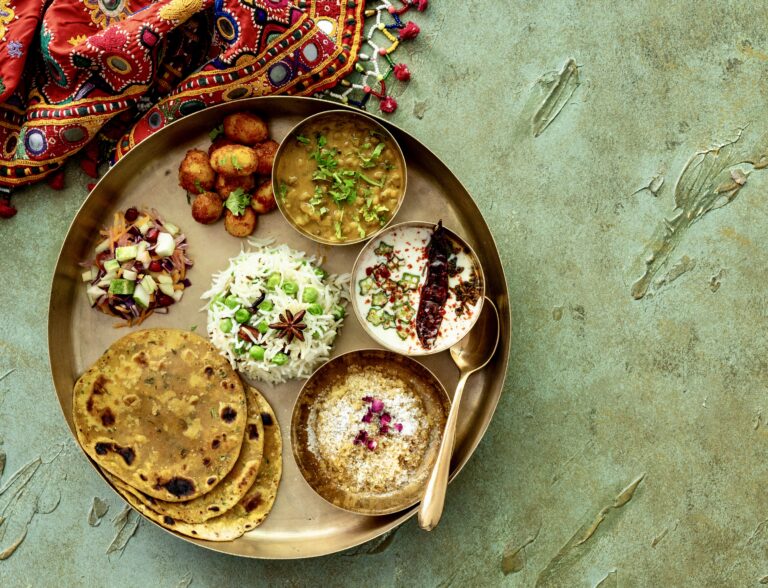The thaali as a concept is very common across Indian households. It is basically a meal with a variety of components, and the composition of each thaali varies depending on the region. It used to be a daily affair in many households, but in contemporary times more and more people have opted for lighter or more quickly prepared meals with fewer dishes involved. There is still a Gujarati thaali served in my home for lunch every day, but as my adult children set up their homes, I don’t see this happening. The thaali then becomes much more occasional and deliberate, and perhaps even festive. For that reason, I felt it would be ideal to share what goes into a Gujarati thaali with Diwali just a few days away.
A Gujarati thaali essentially contains roti, rice, a grain, a kachumber (which is a kind of salad), one or two vegetable dishes and a sweet. These are the basic elements. In my home, I do a rather non-traditional thing and eliminate the sweet dish more often than not. However, on special occasions like my mother-in-law’s birthday, a shrikhand will be included in the thaali. If I am doing trials ahead of sharing dessert recipes for this blog, those will show up there too. There’s an exception to this no-sweet tweak: when it’s mango season, aamras (sweet mango pulp), will be present on a daily basis. Of late, I am offering seva to Shrinathji at home, which means that there is prasadam once a week, and this goes into our thaalis too.
This brings in novelty now and then. The regular thaali can also be made more exciting with the addition of something like sabudana vada, paniyaram or yam chips, which can be prepared ahead of time and served again at tea-time as snacks. I tend to avoid fried goodies in my thaali, but these little things can make lunch more worth looking forward to now and then.
The regular thaali itself can be something really important. It is said that eating together itself holds families together, and I am a believer in this adage too. When it comes to something like a thaali, or any meal that is put together on a daily basis, it therefore becomes a part of the bonds that a family shares. My husband works nearby, so it is convenient for him to pop home for lunch on most days. My children are all far away, but when they come home, there is always a hot thaali available at lunch, and while they may have something else prepared if they prefer, the traditional option is always available.
I am so glad that my kids still honour a request we made when they first moved away, which is that they all return home for certain special occasions. They are made all the more special because of the effort taken. After all, that’s what family is about – taking that extra step to bond and to build love that holds for generations to come.
That brings us back to the festivities. Diwali happens to be one of those celebrations that we all gather together for, which is one of many reasons why it is one of my favourite festivals. I’m eagerly anticipating how in just a few days, over the dining table, there is going to be so much camaraderie, noise, chatter, shouting, fighting and affection – each in the right portions, exactly like a thaali should be presented too. Our Diwali lunches are one of the highlights of the year, and an elaborate thaali is always served. Having this experience, year after year, is something I wouldn’t trade for the world. This is the spread in the thaali this year: peas pulao, bottle gourd thepla, raita bhindi, mixed dal, simple salad, potato roast and of course the once-annual laapsi for dessert. I am happy to share this year’s thaali with you too. Most of these recipes have already been shared over the years, and are linked below along with two new ones for your enjoyment.
I would also like to take this auspicious moment to share something that I’ve been working on for a while. This year, this blog turned 8 years old, and it has really been a journey of growth, discovery and enjoyment. Over time, I have grown in my conviction about my own work, encouraged by well-wishers like you. I am happy to share that I will soon release a cookbook, featuring selected recipes from this blog along with an array of new ones. I want it to be a keepsake that can be passed from hand to hand and from kitchen to kitchen. First and foremost, it is so that my children will have something solid through which to reminisce about their growing years and their family, and to replicate some of their comfort foods and festive favourites. Beyond that, my book will also be for you – and for everyone who loves the experience of preparing a meal. I’ll share more about this project in the coming months. In the meanwhile, I wish you and yours a wonderful Diwali!

Gujarati Thaali
Salad [make a simple one of your choice; for more elaborate ones, see the archive]
Peas Pulao
1 cup cooked basmati rice
1-inch stick cinnamon
2 cloves
1 cardamom
1 star anise
Salt to taste
½ cup cooked/tender green peas
½ teaspoon cumin seeds
1 tablespoon ghee
Heat a pan. Add the ghee and once it is hot, add cumin seeds. Once they splutter, add the cinnamon, star anise, cloves and cardamom.
Sauté and then add cooked green peas, cooked basmati rice and salt. Mix well and gently until it all comes together. Your peas pulao is ready.
Bhindi Raita
1 cup curd
¼ cup finely sliced bhindi (okra/lady’s finger)
Salt to taste
2 tablespoons coconut pieces
1 green chilli
½ teaspoon cumin seeds
½ teaspoon + ¼ teaspoon oil
¼ teaspoon mustard seeds
2-3 dry red chillies
In a blender jar, grind together the coconut, green chilli and cumin seeds until coarse. Set aside.
Heat a pan and add ½ teaspoon oil. To this, add the finely sliced bhindi. Allow to cook on a low flame until the vegetable is golden and slightly tender on both sides.
In another bowl, add the curd with the ground coconut-green chilli-cumin mixture, along with salt. Mix well. Add the sautéed okra and mix gently. Refrigerate until serving.
In a heated pan, add the remaining oil, mustard seeds and red chilli. Temper and pour on top of the raita before serving.
Whether you make all the dishes at once and serve them on a thaali, or try them out one by one, I hope that you’ll find much delight in this year’s Gujarati-style Diwali thaali!

